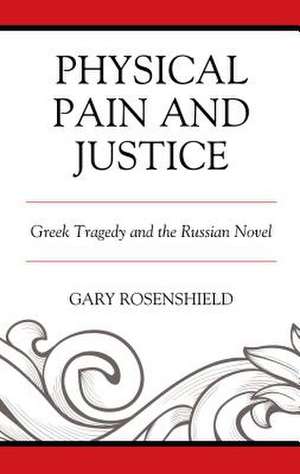Physical Pain and Justice: Crosscurrents: Russia's Literature in Context
Autor Gary Rosenshielden Limba Engleză Hardback – 3 oct 2017
Preț: 684.35 lei
Preț vechi: 888.76 lei
-23% Nou
Puncte Express: 1027
Preț estimativ în valută:
130.95€ • 137.09$ • 108.35£
130.95€ • 137.09$ • 108.35£
Carte tipărită la comandă
Livrare economică 07-21 aprilie
Preluare comenzi: 021 569.72.76
Specificații
ISBN-13: 9781498568456
ISBN-10: 1498568459
Pagini: 216
Dimensiuni: 152 x 229 x 20 mm
Greutate: 0.48 kg
Editura: Rowman & Littlefield
Seria Crosscurrents: Russia's Literature in Context
ISBN-10: 1498568459
Pagini: 216
Dimensiuni: 152 x 229 x 20 mm
Greutate: 0.48 kg
Editura: Rowman & Littlefield
Seria Crosscurrents: Russia's Literature in Context
Notă biografică
Gary Rosenshield is professor emeritus of Slavic languages and Jewish studies at the University of Wisconsin¿Madison.
Descriere
This study examines the treatment of physical pain in a selection of classical Greek plays and nineteenth-century Russian novels. The author highlights parallels between these Greek and Russian texts and analyzes how they employ pain to investigate the legitimacy of the state and the justice of the world order.









